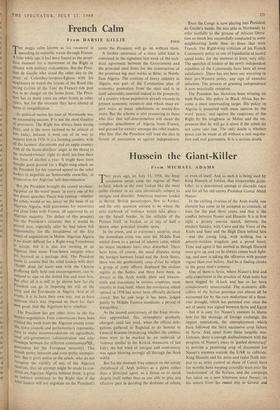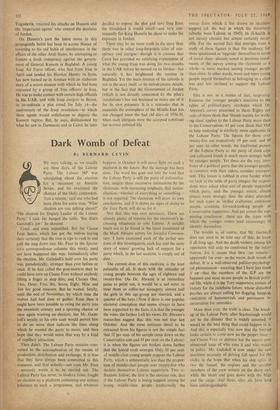Hussein the Giant-Killer
From MICHAEL ADAMS Two years ago, on July 14, 1958, the Iraqi
Two
swept aside the regime of Nuri es-Said, which at the time looked like the most stable element in an area chronically subject to intrigue and disorder. American marines landed in Beirut, British paratroopers flew to lordar, and the only question seemed to be where the next outbreak of violence would take place— on the Israeli border, in the oilfields of the Persian Gulf, in Jordan, or at any of half a dozen other potential trouble spots.
In the event, and to everyone's surprise, once the immediate crisis was over the- Middle East settled down to a period of relative calm, which no major incidents have since disturbed. There have been, of course, the usual disputes along the borders between Israel and the Arab Statcs, there was the gentlemanly coup (Peru: by which a group of army officers displaced the civilian regime in the Sudan, and there have been, as always in the Arab world, plots and treason- trials and executions in various countries, most notably in Iraq itself, where the revolution which opened in 1958 has never been officially declared closed. But by and large it has been, judged purely by Middle Eastern standards, a period of tranquillity.
As the second anniversary of the Iraqi revolu- tion approached, this atmosphere gradually changed; until last week, when the official dele- gations gathered in Baghdad to do honour to General Kassem (wondering whether the celebra- tions were to be marked by an outbreak of violence similar to the Kirkuk massacres of last July), the hot wind of intrigue and controversy was again blowing strongly all through the Arab wdtld.
But for the moment Iraq appears on the untidy chessboard of Arab politics as a pawn rather than a principal agent, as a threat so to speak despite itself rather than as one able to play any effective part in deciding the destinies of others,
or even of itself. And as such it is being used by King Hussein of Jordan, that irrepressible giant- killer, in a determined attempt to discredit once and for all his old enemy President Gamal Abdel Nasser.
In the shifting rivalries of the Arab world, one element has come to be accepted as constant, at least for the past three years, and that is the conflict between Nasser and Hussein. It is at first sight a grossly uneven match, between the modern Saladin, with Cairo and the Voice of the Arabs and Suez and the High Dam behind him —and the young king, with nothing but a poverty-stricken kingdom and a proud heart.' Time and again it has seemed as though Hussein must give up, and yet he always comes back fight- ing, and now is taking the offensive with greater vigour than ever before. And he is finding chinks in the great man's armour.
One of them is Syria, where Nasser's first and only experiment in the practice of Arab unity has been dogged by ill-luck and has so far been conspicuously unsuccessful. The economic diffi- culties of the Syrian province can almost all be accounted for by the rare misfortune of a three- year drought, which has persisted ever since the act of union was signed between Syria and Egypt —but it is easy for Nasser's enemies to blame him for the shortage of foreign exchange, the import restrictions, the unemployment which have followed the third successive crop failure in Syria. And apart from these tangible mis- fortunes, there is enough disillusionment with the progress of Nasser's essay in 'guided democracy' to provide a promising crop of discontent for Nasser's enemies outside the UAR to cultivate. King Hussein and his press iand radio (both sub- ject to as strict control as those of Cairo) have for months been weeping crocodile tears over the 'enslavement' of the Syrians, and the campaign has taken on a new bittelmess since Nasser, on his return from his recent trip to Greece and
Yugoslavia, resumed his attacks on Hussein and the 'imperialist agents' who control the destinies of Jordan.
On Hussein's part the latest move in this propaganda battle has been to accuse Nasser of reverting to his old habit of interference in the affairs of the other Arab States, by attempting to foment a fresh conspiracy against the govern- ment of General Kassem in Baghdad. A young Iraqi Air Force officer, who fled from Iraq in April and landed his Hawker Hunter in Syria, has now turned up in Amman with an elaborate story of a secret mission with which he had been entrusted by a group of 'free officers' in Iraq. He was to make contact with certain high officials in the UAR, and with Iraqi imigrds in Beirut, to co-ordinate a plot timed for July 14—the anniversary of the Iraqi revolution—in which these agents would• collaborate to destroy the Kassem regime. But, he says, disillusioned by what he saw in Damascus and in Cairo, he later decided to expose the plot and save Iraq from the bloodshed it would entail—and very con- veniently for King Hussein he chose to make the exposure in Jordan.
There may be no more truth in the story than there was in other long-forgotten tales of con- spiracy and intrigue—though it is curious that Cairo has provided no satisfying explanation of what the young Iraqi was doing for two months in the UAR before he moved on to Jordan—but naturally it has heightened the tension in Baghdad. Yet the main interest of the episode is not in the story. itself, or its melodramatic details, but in the fact that the Government of Jordan (which is not directly concerned by the pilot's 'revelations') has not hesitated to make use of it for its own purposes. It is a reminder that in essentials the atmosphere of the Middle East has not changed since the bad old days of 1956-58, when such intrigues were the accepted substitute for normal political life























































 Previous page
Previous page